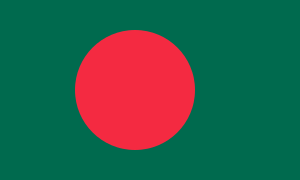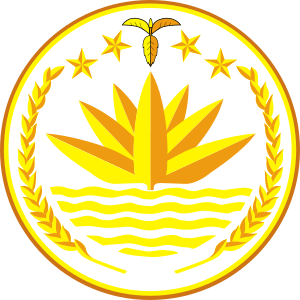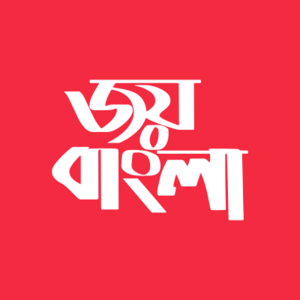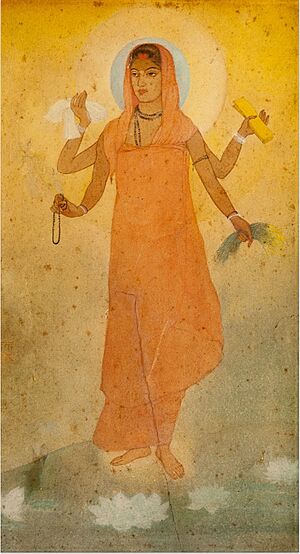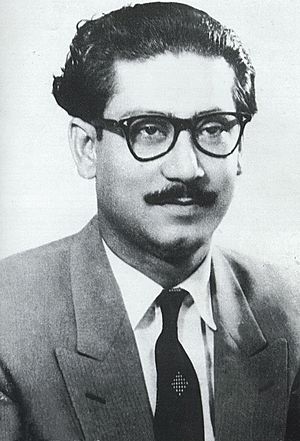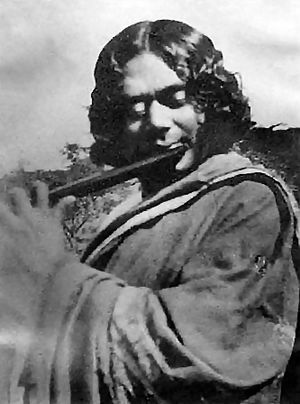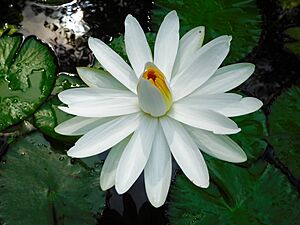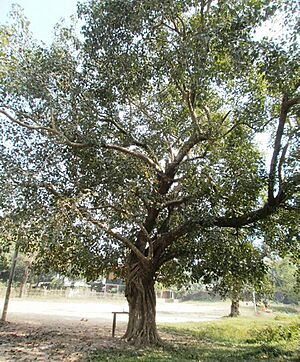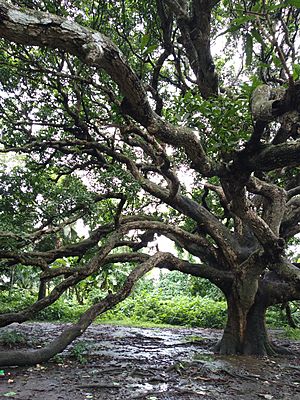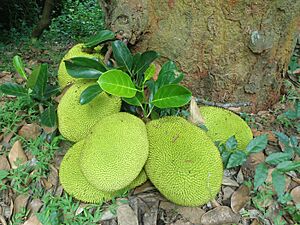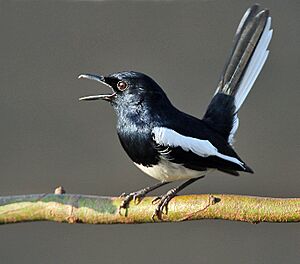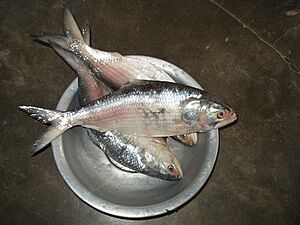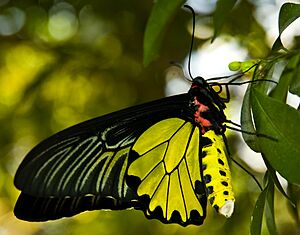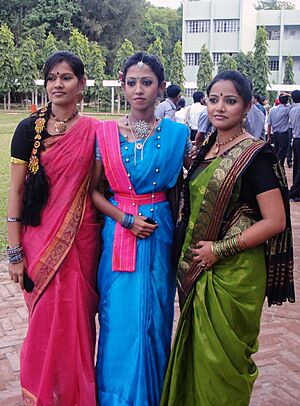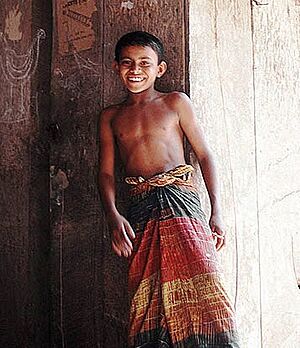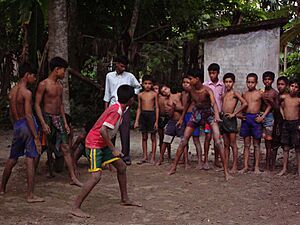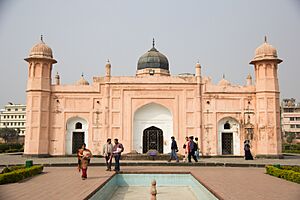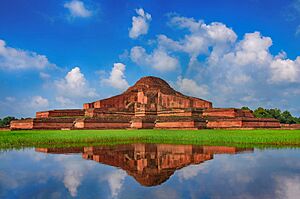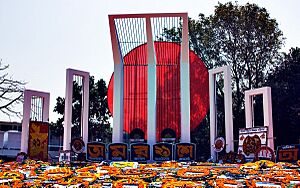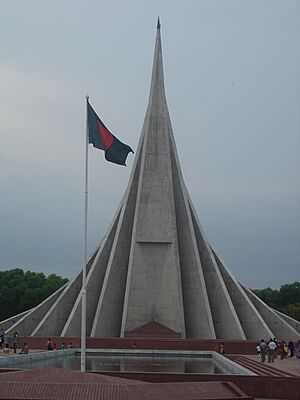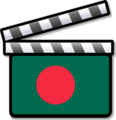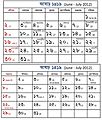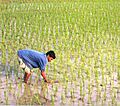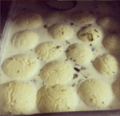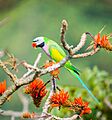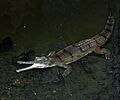National symbols of Bangladesh facts for kids
The national symbols of Bangladesh are special signs and objects that represent the country's traditions, ideas, and history. They show different parts of Bangladesh's culture and past. Bangladesh has many official national symbols, like its flag, emblem, and anthem. It also has other patriotic symbols, such as its national animal, bird, flower, and tree.
Contents
Bangladesh's Important Symbols
The National Flag
The National Flag of Bangladesh is a very important symbol. It is often called "Red-Green." The flag has a dark green background with a red circle in the middle. The green color stands for the green land and the youth of Bangladesh. The red circle represents the rising sun and the blood shed by brave people who fought for the country's freedom.
The National Emblem
The National Emblem of Bangladesh is the official symbol used by the government. It features a water lily, which is the national flower, floating on water. Above the water lily, there are three jute leaves with two stars on each side. Jute is a very important crop in Bangladesh. Below the water lily, there are two rice sheaves, showing how important rice is to the country.
The National Anthem
Bangladesh's National Anthem is called "Amar Shonar Bangla" which means "My Golden Bengal." This beautiful song was written by the famous poet Rabindranath Tagore. It expresses deep love and pride for the land of Bengal.
The National Language
The national language of Bangladesh is Bengali, also known as Bangla. It is the official language used throughout the country. Many people fought to make Bengali the official language, showing its importance to the Bangladeshi identity.
The National Slogan
The National Slogan or War Cry of Bangladesh is "Joy Bangla!" This phrase means "Victory to Bengal" or "Hail Bengal." It was a powerful slogan used during the country's fight for independence and is still a symbol of national pride.
National Heroes and Leaders
Bangamata: Mother Bengal
Bangamata, meaning "Mother Bengal," is a special way of thinking about Bangladesh as a mother figure. It represents the land, people, and culture of Bengal as a loving mother.
Sheikh Mujibur Rahman: Father of the Nation
Sheikh Mujibur Rahman is known as the "Father of the Nation" or "Bangabandhu" (Friend of Bengal). He was a very important leader in Bangladesh's history. He led the country to independence and is remembered for his dedication to his people.
Kazi Nazrul Islam: The Rebel Poet
Kazi Nazrul Islam is the National Poet of Bangladesh. He is also known as the "Rebel Poet" because his poems often spoke about freedom, justice, and fighting against unfairness. His writings inspired many people.
Nature's Symbols of Bangladesh
The National Flower
The national flower of Bangladesh is the Hairy Water Lily, also called Shapla. This beautiful flower grows in water and is often seen in ponds and lakes across the country. It symbolizes purity and beauty.
The National Tree
Bangladesh has two national trees: the Banyan Fig and the Mango Tree. The Banyan tree is known for its wide-spreading branches and aerial roots, providing shade and shelter. The Mango tree is culturally important, and its fruit is very popular.
The National Fruit
The Jackfruit is the national fruit of Bangladesh. It is a very large fruit with a spiky green skin and sweet, yellow flesh inside. It is a popular and important part of the Bangladeshi diet.
The National Animal
The Bengal Tiger is the national animal of Bangladesh. This powerful and majestic big cat is known for its distinctive stripes. It lives in the Sundarbans mangrove forest, a unique habitat shared by Bangladesh and India. The Bengal Tiger is a symbol of strength and courage.
The National Bird
The Oriental Magpie-Robin is the national bird of Bangladesh. This small, black and white bird is known for its beautiful song. It is commonly found in gardens and open woodlands throughout the country.
The National Fish
The Illish Herring, also known as Hilsha, is the national fish of Bangladesh. It is a very popular and delicious fish, especially during the monsoon season. It is an important part of Bangladeshi cuisine and culture.
The National Butterfly
The Golden Birdwing is the national butterfly of Bangladesh. It is one of the largest butterflies in the world, known for its striking golden and black wings.
Cultural and Historical Symbols
National Dress
The Shari for women and the Lungi for men are considered the national dresses of Bangladesh. The Shari is a long piece of fabric draped elegantly around the body, while the Lungi is a traditional wrap-around skirt worn by men.
National Sport
Kabaddi, also known as Ha-du-du, is the national sport of Bangladesh. It is a team sport where players try to tag opponents in their territory while holding their breath and chanting "kabaddi."
Lalbagh Fort
Lalbagh Fort is a historic fort located in Dhaka, the capital city. It is also known as Lal Bagh Qila, meaning "Red Fort Garden." This fort is a significant example of Mughal architecture in Bangladesh.
Somapura Mahavihara
Somapura Mahavihara is a very old Buddhist monastery and a UNESCO World Heritage site. It was once a large center for learning and worship. It is considered a national heritage site, showing Bangladesh's rich history.
Shaheed Minar
The Shaheed Minar in Dhaka is a monument built to remember the people who died during the Bengali Language Movement in 1952. It is a powerful symbol of the fight for the right to speak Bengali.
National Martyrs' Memorial
The National Martyrs' Memorial is a monument in Savar, Dhaka, built to honor those who died in the Bangladesh Liberation War of 1971. It is a place of great respect and remembrance for the nation's heroes.
Images for kids
Related pages
 | George Robert Carruthers |
 | Patricia Bath |
 | Jan Ernst Matzeliger |
 | Alexander Miles |


